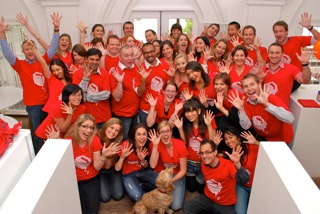Management Revolution
I received the email below yesterday, just after RedBalloon for Corporate hosted a Webinar on Employee Engagement for 250 people. I didn’t receive the email until after the event. But I assume that this person was commenting on the session regarding this ‘management revolution’.
Alas, the email was not signed and was sent from an unknown email… so I guess the best thing to do is to respond here.
Date: 10/27/09 15:50:00
“Naomi Simson, WAKE UP ! People go to work TO BE PAID, VERY few ( ‘cept maybe some women) want ANY so called ‘thanks’ for doing what they are paid to do. OH! I forgot, we are now in the 21st (oops, the ‘touchy-feely, namby-pamby’) century. THIS attitude is one of the major problems in the world today. Management have THEIR job, also. That does NOT include holding the hands of people with self esteem problems. If the employee’s WEREN’T doing a good job, they’d get fired! I suggest you find a job that has some meaning.”
Firstly thank-you to the author (and I will for the sake of writing refer to this person as a ‘him’ given the reference to women) for letting me know your thoughts. Without taking the time to write, I would naively go along my merry way thinking that the whole planet is in harmony when it comes to managing and engaging people this century.
People go to work to be paid for performing certain tasks. This, of course, is the basis of western economies. A person has skills and time which they sell to an organisation in return for a salary. People must be paid for what they do. It puts Wheeties on the table, keeps children in school shoes and all the essential things that we have because we work.
The thing is that those people selling their skills and time ie employees – have a choice. In fact, they have many choices:
- Do I choose to work here – or work somewhere else for the same money (or in some cases less) because I feel better about myself and what I achieve at the place? Does my employer notice what I do?
- Do I work hard when I’m at work and use my initiative or do I do the bare minimum?
- Do I want to fit in and assist those around me – or make life hard for others?
- Do I tell people outside of the organisation about what a good company I work for – or that I hate my boss?
- Do I recommend it as a great place to work – or am I asking my friends if its better at their work?
- Do I want to continue to learn, grow and develop so I can add more for my employer and in return myself or do I do the minimum I can get away with?
This is fundamentally the question of discretionary effort. An employee can either choose to participate fully or not. They can simply go to work – do what they are told and go home without thinking about it – or be thinking they will be fired. Or they can use their ‘discretionary’ effort for the good of the whole business and ultimately its profitability.
A can assure you, sir, that I am wide awake. I am listening, learning and alert, listening to business leaders and HR directors. All wanting and needing to do more with less. As Ann Sherry noted at the recent HR Leader awards – if you mention the word ‘productivity’ then you are really talking about ‘people’ they are in fact one in the same thing – people doing things to improve, innovate, and grow a business.
This is simply a question of commercial return. I really like the people I work with; the RedBallooners, I am interested in what drives them, what they are passionate about, I love discovering what journey they are on and what is important to them. This cannot be faked. I like people.
The first step to being an effective manager is to like people. And be truly interested in them. If you’re a manager and don’t like people, perhaps you’re in the wrong job. Business is a people game.
Sir, thank you for your contribution, it is greatly appreciated. To see that there are people who are still well entrenched in the past. Your business may well thrive without the ‘namby pamby touchy feely’ acknowledgement of people. But I am not alone in seeing great commercial returns from listening to my team, and responding, in the same way, I do with customers. I leave you with some powerful statistics – let the numbers speak for themselves:
Companies that raise employee satisfaction by 20% will increase financial performance by more than 42%.
Global Study by David Maister, Practice What You Preach: What Managers Must Do to Create a High-Achievement Culture (2001). Sourced from www.vault.com December 2008
A detailed study of 40 global companies found that firms with the highest percentage of engaged employees collectively increased operating income 19% and earnings per share 28% year-to-year. Those companies with the lowest percentage of engaged employees showed year-to-year declines of 33% in operating income and 11% in earnings per share.
Towers Perrin Global Workforce Study. Sourced from www.humanresourcesmagazine.com.au December 2008
“Companies that utilised an effective employee recognition program enjoyed a 109% three-year median return to shareholders vs. a 52% return for those companies that did not.”
Watson Wyatt Study of 3 million employees, as quoted in Forbes magazine (2004)
Hays Group research shows that 70% of engagement is determined by the employee’s direct manager.
The Hays Group, www.hayscompanies.com (2008)

